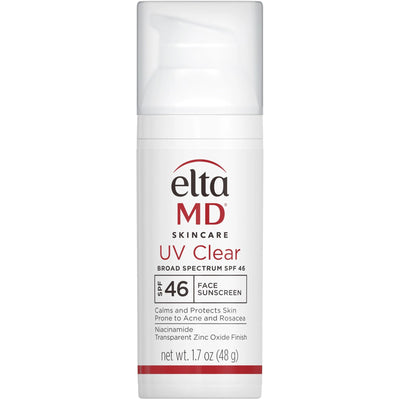Got Sunscreen in Your Eye? How to Stop It From Stinging

It may surprise you to learn that the first sunscreen with an SPF rating had a rating of only two! Things have come a long way since then, and there are products available that block most of the sun's harmful rays.
Unfortunately, getting sunscreen in your eyes can be an unpleasant experience. Looking for answers to "sunscreen in eye how long does it last?" We've got the information you need to know. Let's get started.
Sunscreen in Eye How Long Does It Last?
Depending on how much sunscreen you got in your eye, it could last anywhere from a few seconds to over 10 minutes. This can be highly inconvenient, especially if you're engaging in athletic activity.
For example, it's common for people who play sports outdoors like soccer and basketball to wear sunscreen during the day. When sunscreen gets in your eyes, it could substantially mitigate your performance.
To make matters worse, this problem likely won't go away on its own. There are steps you need to take to resolve the situation.
Taking Action
If you get sunscreen in your eye, you should flush it with running water as soon as possible. If you don't have access to running water, use bottled water if it's available.
It often takes between 10 and 15 minutes to flush away all of the sunscreen. However, it could take longer in some cases. Regardless, keep flushing your eyes periodically until you feel noticeable relief.
After you've washed it away, you may experience mild irritation. In most scenarios, you will be able to resume your previous activity shortly after. If irritation persists, consider using soothing eyedrops to remedy the situation.
Chemical vs Mineral Sunscreen
Many people are unaware that there's a difference between chemical and mineral sunscreen. Mineral sunscreens don't use chemical-based UV filters.
Instead, the formula physically blocks UV radiation. Mineral sunscreens contain titanium dioxide and zinc oxide.
In contrast, chemical sunscreen dissipates UV rays to make them less potent. The issue with mineral sunscreens is that they need constant reapplication. It's fairly easy to rub, sweat, or rinse them off.
However, the chemical UV filters within chemical sunscreen are the primary irritants when sunscreen gets in your eye. So, it's recommended to use mineral sunscreen on your face.
How to Apply Sunscreen
Most adults need about one ounce of sunscreen. To put this into perspective, this is about the same amount you could fit into a shot glass. It's best to apply sunscreen before going outdoors to ensure you are protected.
The product you choose should be water-resistant and have an SPF rating of 30 or higher. Use specialized sunscreen like EltaMD when applying it to your face. The product should also provide broad-spectrum coverage.
You should apply sunscreen to all areas of your skin that will be exposed. Common areas people forget are their ears, the backs of their necks, and their hands.
Remember to apply sunscreen to your lips, as well. Reapply at least every two hours. You should reapply more often if you are swimming or sweating.
The Dangers of UV Rays
The dangers of UV radiation should never be ignored. There are three primary types of UV rays: UVA, UVB, and UVC.
Nearly all of the radiation that reaches Earth consists of UVA. Some UVB rays pass through the atmosphere, however.
Short-term overexposure to UV radiation can result in sunburns. Although painful, these aren't inherently dangerous in themselves if they're minor. Long-term complications include premature aging and an increased risk of skin cancer.
If proper eye protection is not used, long-term exposure can also increase your risk of developing eye diseases. People most susceptible to UV rays include those with light hair, eyes, and skin.
Those who spend a lot of time in the sun are also more susceptible to UV radiation. In some cases, certain drugs can increase your UV sensitivity.
These include cosmetic products, birth control pills, and antibiotics. Be sure to research the medication or products you use before spending time in the sun. Finally, those who have family members with skin cancer should also avoid long periods of sun exposure.
In addition to wearing sunscreen, you can protect yourself by staying in the shade during midday hours. It's also recommended to wear a wide-brimmed hat to cover your neck, ears, and face. You should avoid tanning beds at all costs due to the high level of UV exposure.
Other Tips
When it comes to sun protection, don't forget that you can wear SPF-resistant clothing. There are products available in many different fabrics and styles, allowing you to stay protected without sacrificing your aesthetic appeal.
Sun protection clothing is recommended for anyone who spends a large amount of time in the sun. For instance, those who work at construction sites should consider wearing sun-resistant pants and long-sleeved shirts. The same can be said about those who often find themselves at a golf course.
As long as you take the proper precautions, you can avoid many issues you may have otherwise had to deal with.
Apply Sunscreen Carefully
By applying this product correctly, you're unlikely to encounter issues. In the event that you find yourself asking "sunscreen in eye how long does it last?" the above information has everything you need to know. From here, you'll be back to enjoying your day as soon as possible.
Speak with a representative today at Minou & Lily. We pride ourselves on stocking high-quality products that can meet all of your sun protection needs.











